Clerks, and the value of the “Downer Ending”
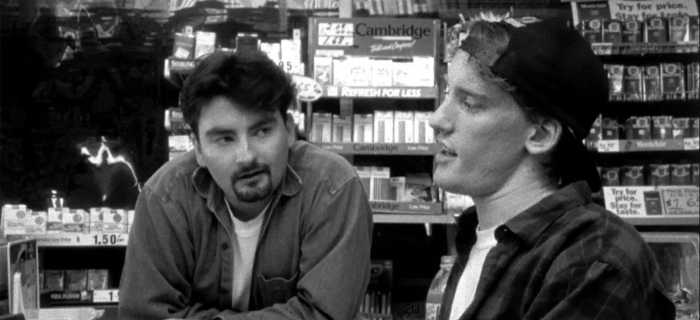
That’s what life is, a series of down endings.
Within the public canon of the 1990s quite a few films stand out as real testaments to the cultural milieu, in so far as the general sense of malaise that pervaded the public consciousness was not so alien to be undefinable, but so all encompassing that it crossed racial, social, gender and class lines and was able to be illustrated in a variety of films.
Within the 90s audiences were presented with masterpieces of black cinema such as Boyz in the Hood and Menace II Society, explorations of the plights of black men in poverty and the cycles of violence that affected Black neighborhoods and communities.
Works such as Set it Off and Thelma and Louise became mainstays in popular canon as feminism became less of a taboo and more of a common mainstream discussion though feature protagonists that were criminals in place of heroines. Film was broaching themes and topics often left under explored if acknowledged at all.
With regards to mainstream culture there was also the rise of films that explored Generation X. The Id and Ego of the “Lost Generation” gave rise to some of the most notable films of the 90s, such as Fight Club and Office Space stand as testaments to the general mood of directionless that existed more and more of Gen X came into their adulthood at the “end of history”.
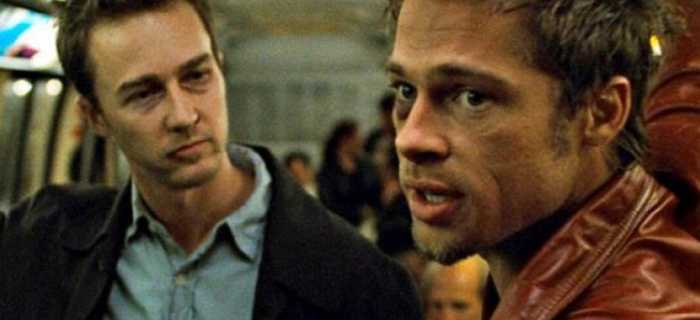
And if history had ended what was to be done? What great cause could be rallied for? The failure to answer these questions gave rise to one of the most well known tropes and faces for Generation X.
The slacker. A character defined not by desire, but the lack there of. The existence not for a grand purpose, but possibly cognizant that no grand purpose can be had. A sort of Bartleby the Scrivener, not revelling in their lot in lot but also not actively protesting it. Just sort of floating along, accepting what comes their way.
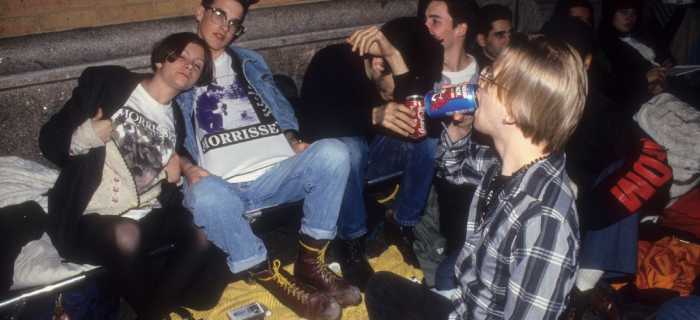
A Lost Generation
With regards to the term slacker and the culture zeitgeist that really propelled it into the mainstream canon, Generation X the children of the Baby Boomer generation were often defined by what they were not. While The Baby boomers inherited the gains of the U.S.’s war production, Generation X was raised during the Cold War, the series of proxy wars between the 1st and 2nd worlds over the path forward for the developing third. This in turn lead to the collapse of the multipolar world. As previously mentioned the 90s were meant to exist as the “end of history”.
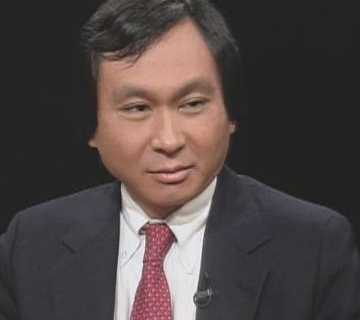
As the term coined by Francis Fukuyama would imply, nothing major was going to happen in the world as the United States existed as the hegemonic end point of the world culture, that no great wars were left to be fault, that no major shifts would occur.
While hindsight can see that was an incorrect assertion, and criticism did exist at the time there was a real case to made about the major conflicts of the world being resolved. But with that resolution, came no absolution, that is to say, history was supposedly over, so what exactly was the point of existence in the 90s and going forward?
With regards to the generational id there was no real sense of purpose. The lack of purpose, the rejection of “consumerism”, the refusal to sell-out and become “like your parents” became the marker for the generation’s ethos. A sort of apolitical rebellion, a cultural libertarianism of anti-establishment, anti-authoritarian, resistance to any interlocuter who would ask something of “you” 1
Clerks as a Cultural Touchstone
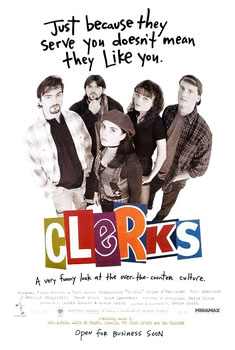
This is where Clerks enters the discussion. Clerks was the debut film of director Kevin Smith and at face value is a pretentious showing of the slacker lifestyle. The movie’s scenes are presented over the course of a day with black screen with a single word of sesquipedalian text serving as the transitions between plot points. But what the film offers is a damning insight to the way that a fatalistic view can become self-fulfilling, how cynicism breeds more cynicism, and though the theatrical cut ends on an optimistic note, the alternative ending also holds a thematic value.
To begin, a brief summary of the film is that the main character, Dante Hicks is called into work on his day off, during the course of the day he is plagued by various bothersome customers, judgemental classmates, chewing gum salesmen and his friend and co-worker Randal Graves.
He spends the day complaining about his job, about his life, and juggling his romantic interests until the climax where he argues with his Randal and both of his love interests are removed from his life. The movie ends as he ends work and goes home.
Dante as the “X-everyman”

I’m not even supposed to be here today.
Dante Hicks is a character within a morality play. He does not act so much as he is acted upon by the world around him. In the rare case that he takes initiative it routinely and explosively blows up in his face.
But, the effect belies the cause. Dante, as a slacker archetype could never really take initiative, that would break the archetype. Dante over the course of the day, is unable to leave because his boss swears to come in, his boss is revealed over the course of the day to have left town.
Dante has to be pressured by those around him to take any form of rebellion even though he is more than vocal in his complaints about hating his job, hating the customers, his insecurities with regards to women.
Dante is the perfect slacker of the 90s in so far as nothing he does matters, so he actively does nothing.
The problem with “Ending” it.
The Ending of Clerks is unsurprisingly anti-climatic. After a day of complaining, a case of necrophilia, a bad break up, and multiple people giving him advice on what to do with his life, Dante stays at the job he hates until close.
Why? Why does a person continue to do something they vocally hate? Dante as a character is a directionless amoeba bouncing from scenario to scenario with no sense of gravity and mind of his own. So what is he, who is he?
Kevin Smith is on the record as to having difficulties in coming up with the ending for the movie. He decided on the more positive one because test audiences hated the “original”.
The Director’s cut of Clerks, goes in an arguably more thematically appropriate direction for the ending though. The entire movie, Dante has complained about his lot in life, complained about things not being fair to him, and yet taken no action. In his own mind nothing good happens, so what is it if something bad happens.
In the Director’s cut ending, Dante is murdered. The security camera is turned off so his murder will never be found in this timeline and the murder is ultimately pointless.
Dante’s true “fate”
The movie starts with “It’s a meaningless end to this story” and what is more meaningless than the murder during a convenience store robbery. The store Dante works at doesn’t make a lot of money. The murder wasn’t from rage or spite. It was a pointless death. Especially with what is shown of Dante, the robber could’ve taken the money and left him alive.
Dante’s untimely demise was similar in that regard to the ending he liked so much in Empire. A down note and then he died. In a way, how else should or would the story of Dante end? The sequel shows that Dante has little to no motivation, so can it be argued his life was even being lived?
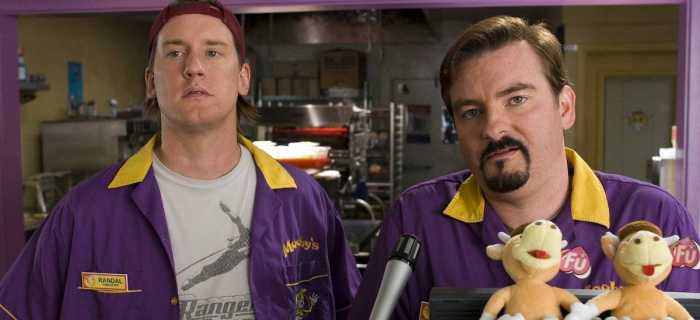
Fatalism as it is commonly understood is summarized as a “surrender to the inevitable.” A bleak outlook to people who feel a great sense of self or duty but what of Dante? A man with no great purpose. No great sense of self.
Dante’s one trait consistent between his two movies and numerous cameos is an inability to make a decision. In love, in life, in anything really Dante is indecisive to a fault and one can’t help but wonder if that’s due to a worldview shaped by a fundamental belief that nothing that he does or doesn’t do matters so he can just exist until he stops existing.
And if that’s the case, does it really matter if he died in the first movie or lived to see the sequels?
Works Cited
- Phillips-Fein, Kim. “What’s Left of Generation X.” Dissent Magazine, 25 Mar. 2020, https://www.dissentmagazine.org/article/whats-left-of-generation-x. ↩
What do you think? Leave a comment.











A profound piece.
Thank you so much!
Not seen it in years, which is something I should rectify. I originally saw it in Guatemala of all places, in the funkiest “cinema” I’ve ever encountered; a couple of old sofas for seating, and a makeshift bar right behind us. Ideal venue for it, in an odd sort of way.
Smith has talent, but he usually comes across like a man who needs to grow up.
That’s a fair critique.
Clerks is far and away his best film. Chasing Amy was OK but I really didn’t like too many of the others at all. The main thing is that J&SB are the worst thing in Clerks and they became far more prominent. J&SBSB is one of the worst films I’ve ever seen.
That’s unfair, Chasing Amy is an excellent film. Far more mature film than Clerks (which is not a slight on Clerks). Shame he hasn’t developed as a filmmaker from that point.
I had it on VCR but must have thrown it out when I switched to DVD. Must buy it back sometime.
Clerks remains one of my top ten, seeing Randall and Dante being thrown out of a funeral lingers in my memory for some reason. It is of course a cautionary tale of retrospective jealousy, among many things.
Retrospective jealousy?
Is it fair to say: the smaller the Kevin Smith film, the better it is?
I’d not wager against it.
Great film, very influential, more than most people realise. Shame Smith never really kicked on as a filmmaker and built a strong body of work later on. After Clerks and the mature, excellent Chasing Amy I really thought he was going to make bigger and bolder films and become a major player. He even quit filmmaking a couple of times. I did really like Red State though. Saying that, he’s achieved much more than 99% of wannabe filmmakers could imagine in their wildest dreams so I’ve got nothing but respect for the guy.
He’s done some good TV directing work. I think his biggest problem is controlling his worst urges in the writing.
He’s a superb editor.
Film should have an emotionally-satisfying ending. Which may be happy, or may be not, but it should feel right, and fitting.
Why?
Sometimes puzzling endings are more interesting. It gets people talking and keeps alive the film in popular culture.
The Italian Job being one of the best examples.
Also Margaret Atwood – Oryx and Crake. Very unfinished ending. But somehow fitting.
Agreed. What has always annoyed me is when characters I like get killed off either for deliberate tear-jerking purposes or as a cop-out, because the author can’t be bothered or doesn’t know how to resolve their story.
I agree. I’ve read several books recently where a good, complex, likeable and interesting female character has been killed off apparently just to provide the hero with a motive for revenge or a reason to become complex and interesting (though not necessarily likeable) himself. It smacks of laziness, or of an inability to write about successful relationships.
Thanks!
Very Interesting Article, I love how you were able to dissect the value of sad endings!
I quote this film (and the Blues Bros.) the most of any films.
Are you me? 🙂
Best is when Dante tells Veronica not to sk any dlck in the parking lot and some dude follows her.
What else? Randal reading out the list of films in front of the mother. Starting with benign sounding titles then getting X rated.
I haven’t watched in for years, but remember it as a brilliant film. It is still by far the best that Kevin Smith has ever been involved with.
Dogma, Chasing Amy and Jersey Girl are my favourites – plus there’s Red State.
I just finished watching Clerks and it really inspired me to start making a film. I was just thinking “why aren’t more people making films? Cameras are pretty good an cheap these days.” I guess it comes downs to people either thinking that they have to make their films look like a Hollywood blockbuster and pay for a ARRI camera or they’re just afraid to try. I hope that there will be a renaissance of low budget indie films, I feel like it’s really needed with all the half a billion dollar movies being made today.
Generally, most of the books and poems we ‘did’ at school were downbeat. I sometimes wonder if it was a deliberate ploy to make us pessimistic so we wouldn’t try to change the status quo.
I went to the cinema to see this film three times. I do cringe a bit when I watch it now but when it was released it was really something. A shoestring budget production that would be difficult to repeat today.
This was in the 90s, before tech exploded. Now everyone has a passable movie camera in their pocket and video editing software on their laptops (and a recording studio), so where’s the beef? Maybe the would-be auteurs of today are too busy trying to be youtube celebs to make anything like Clerks.
Today’s would be auteurs are inspired by guys who talk about video games … wait for it … as they play them. Who needs narrative! My 10 year old thought up a great simple YouTube idea and then when I started to encourage him, decided ‘nah, actually I just wanna be like ‘insert guy who plays games.’
Blew my mind when I first saw it.. it’s been years now.. must recap!
Reaches into DVD cupboard and pulls out ‘Clerks’ and ‘Chasing Amy’. That’s my day sorted.
Excellent idea! [Heads to DVD cabinet, pursued by a bear]
Chasing Amy is criminally overlooked, it’s one of the top 90s comedies without doubt, and has some fantastic performances.
Some stories are far worse for having happy endings. It makes them completely unbelievable and ruins the narrative that’s been built up. Still if done right they’re fine.
It only ran for 2 weeks on American network TV 20 years ago, but I’d suggest watching the Clerks Animated series. It aired in 2000, just as the Simpsons was starting it’s slow descent into mediocrity. The show might be the best thing that Kevin Smith’s ever been a part of. Also it gave us the immortal line:
“Ohmygod, bear is driving how can that be?”
Obviously Clerks 2 is dreadful but here’s a question for real nerds. Did anyone ever see the animated series they did?
I hope it feels so good to be right. There’s nothing more exhilarating than pointing out the shortcomings of others, is there?
Love this film but it always reminds me of when I thought it would be a good idea to watch it with this Christian girl I really really liked. Sort of ended my chances right there I think.
Loved the movie when it came out, but Smith’s subsequent career – terrible movies about imbeciles, with undertones of racism, sexism and homophobia – has stopped me from revisiting it.
Kevin Smith: I made 7 movies that suck ass.
Audience: In a row?
Just kidding. 🙂
I was fifteen years old and working at a video store when I first saw this film. Randall was my hero! I wish I could’ve said the things he says to some of the customers.
What a film, nailed the frustration felt by so anyone who’s ever worked behind a counter. I was working in an ESSO station when I first saw it and longed to do a Randal and tell a customer what I really thought of them.
I was shown it on DVD by a friend who was stuck in a dead end job. He told me to captured perfectly the strange inane and weird conversations you would have just to while away the long boring hours.
The best stories rarely have a happy ending.
I started this thing were my son and I take turns picking a movie to watch when he comes over every weekend and yesterday he picked Clerks as his movie. We watched it before but out of all of Kevin’s movie he likes Clerks the best.
I was a 20-something Gen X slacker who worked in a video rental store when this came out. This movie WAS my life, and I’ll never get tired of watching it.
Clerks, Mallrats and Chasing Amy all came out when I was in high school. It’s impossible to overstate how big these movies were to me and my friends.
My favourite bit, the customer who tells them about the Stormtrooper themed wedding rumour, and Dante’s reaction. “Wait, I’m the bitch?!?”
I have always loved this film. My kids were almost teenaged and I let them watch this film. They were blown away and told all their friends and suddenly our house was real popular. Much popcorn and snacks were eaten and the film was discussed and parodied. Wish Kevin hadn’t lost him mind over the comic book movie situation.
The greatest line in the English language is ‘and they all loved happily ever after.’
Sam Raimi and Kevin Smith showed that you could put together a film on a razor thin budget with nothing but passion and hope.
Having worked in retail, totally get this film.
A great quick little read thanks. I really enjoyed this film, it suckerpunched me with the feels!
Kevin Smith’s autobiography, Tough Sh*t, goes deeper into the idea of the “slob.” He talks a lot about how he tries to find motivation in life and thanks the people that helped him get there. Mallrats, as well as the sequels to the Clerks series, all go further into the idea of a pointless existence. I think that musicians such as Beck, with his album Mellow Gold serve as a generational illustration of the angst and confusion that generation X had in their search for meaning, and the end of a pointless existence.
Definitely going to be watching the director’s cut of the movie, without the “downer” ending the movie simply stops and that’s not very entertaining
Some of my favourite movies have what might be considered “downer” endings, but I still love them!